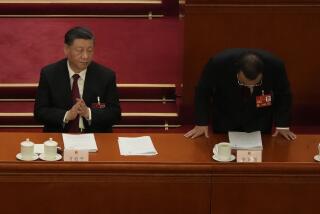Deng Seeks to Oust Chinese Hard-Liners : Politics: The outcome of the struggle by reformers against ideologues will affect economic change and intellectual life.
- Share via
BEIJING — Senior Chinese leader Deng Xiaoping has triggered an aggressive effort by reformers within the Communist Party to oust hard-line ideologues from key party and government positions.
Acting Minister of Culture He Jingzhi has already submitted his resignation, Chinese sources told foreign reporters in Beijing on Saturday. Others facing pressure from reformist forces include Wang Renzhi, head of the party propaganda department, and Gao Di, who heads the official newspaper People’s Daily. All three men have played key roles in implementing harsh political controls after the 1989 massacre of pro-democracy protesters in Beijing.
Ultimate targets of the reformist drive may be hard-line Premier Li Peng and Politburo Standing Committee member Song Ping.
The outcome of the struggle will affect both the pace of economic reform and the tenor of intellectual life in China during coming years. “For you, it will be interesting (to watch),” a retired Chinese scholar commented to a foreign friend. “For us, our fate is at stake.”
Li’s five-year term as premier expires early next year, and some Chinese in Beijing predict that he will be required to leave the post at that time. One scenario has Li moving to China’s presidency, a prestigious but intrinsically less powerful office. Gao is seen to be closely allied with Li, so if he loses his People’s Daily post, that could signal a weakening of Li’s power.
Song may be demoted at a party congress scheduled for late this year, according to speculation circulating among reformist Communist Party members. Song, 74, is said to have angered Deng by arguing that ideological orthodoxy should be given equal importance with economic development. While Deng has always insisted that the Communist Party’s dictatorship must not be challenged, he also has consistently favored ideological pragmatism and an emphasis on economic growth.
Deng, 87, remains the most powerful individual in China, but he is not strong enough to make top-level personnel changes on his own authority. Rather than issuing orders, Deng must achieve his goals in part by giving signals that change the political environment and mobilize the efforts of others.
It remains uncertain whether the reformists’ drive will succeed. Much depends on the relative health of Deng compared to other octogenarian power-holders during the coming months.
The power of hard-line ideologues grew after the 1989 massacre for at least two reasons: Deng needed them to reassert political control over a rebellious nation, and they enjoyed even stronger support from other old revolutionaries who played vital roles in ordering the crackdown.
But now, several other key elders are so sick or senile they can barely function. Former President Li Xiannian, 82, is apparently losing his mental acuity in addition to suffering from illness, and Vice President Wang Zhen, 83, is rumored to be near death. Both of these men, and several other powerful octogenarians who also have dropped out of sight, lean more toward hard-line orthodoxy than does Deng. Their illness creates better conditions for economic reform and ideological relaxation and may increase Deng’s ability to install proteges in key posts.
Deng’s efforts appear primarily aimed at removing ideological roadblocks and bureaucratic resistance to an expansion of market-oriented reforms, including such measures as the sale of stock in what have been state-run enterprises. There is no indication that Deng himself favors genuine political liberalism or a reversal of the judgment that the army crackdown on the 1989 protests was justified.
Deng set the latest wave of political maneuvering in motion with a January trip to the southern coastal city of Shenzhen, a “special economic zone” adjacent to Hong Kong that serves as an experimental base for the reforms. The trip was a symbol of Deng’s support for accelerating economic reforms.
While in Shenzhen, Deng gave his journey stronger political overtones by declaring that “whoever is opposed to reform must step down.” Although Deng’s trip was given only minimal coverage in China’s state-run domestic media, his comments were reported in Wen Wei Bao, a Beijing-controlled newspaper in Hong Kong. In the weeks since then, a speech by Deng emphasizing accelerated reforms has been circulated among high party members, according to Chinese who have spoken with foreign reporters in Beijing.
Such actions by Deng have the effect of forcing officials at all levels of the party and government and in the state-run media to offer more forceful support for economic reform. This undercuts the political strength of those who have emphasized strict ideological controls.
One indication of the changing mood in Beijing is growing speculation that even Zhao Ziyang, the reformist party chief ousted in 1989 for allegedly sympathizing with the student demonstrators, might return to a position of prominence after the autumn party congress.
More to Read
Sign up for Essential California
The most important California stories and recommendations in your inbox every morning.
You may occasionally receive promotional content from the Los Angeles Times.













